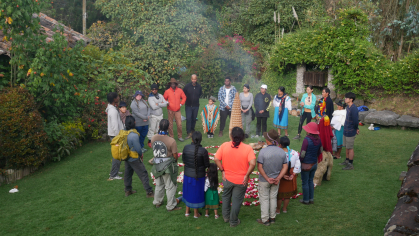Rutgers-Newark Highlights Nationally Recognized Programs that Boost Upward Mobility

Rutgers University-Newark, which is ranked #5 nationally for social mobility, is touting programs with a high rate of success in helping students from all backgrounds find jobs in their chosen field or earn graduate degrees.
At a recent event on campus focused on social mobility – which measures the ability move up the economic and professional ladder– Rutgers-Newark Interim Chancellor Jeffrey Robinson stressed that one of the school’s top missions is to provide career pathways, often in fields students would not have considered before enrolling. He emphasized the importance of social mobility and upward mobility as the driving force behind the American Dream.
“We know that talent, ability, and intelligence are distributed across all of our communities, but access and opportunity are not. At Rutgers-Newark, we use the halls of this institution to create, promote and distribute access for our entire community,'' he said.
Rutgers-Newark has helped thousands of graduates from New Jersey and beyond attain economic security and rewarding jobs. It has a proven track record of supporting young people from communities throughout New Jersey and beyond. It is one of the most diverse schools in the nation–where 58 percent of students are the first in their families to attend college–also ranks #12 for Pell Grants recipient graduation rates. Pell Grants are awarded to students from low-income families.
Alumnus Ty-Lynn Johnson, a Newark resident, said his parents worked at Dollar Tree when he was a child but sacrificed so he could attend private school.
At Rutgers Business School’s Newark campus, he joined the Business Student Transition, Access and Retention (RBS B-STAR) program, where 100 percent of students went on to secure jobs in their field last year. The B-STAR Program helps high-performing students, develop job skills, career strategies, and form networks that include corporate leaders from Fortune 500 companies and other firms.
Johnson, who landed a job at Black Rock as an Investment Associate after graduation, is now an equity research analyst at Jeffries, a global investment banking firm.
“I cover Dollar Tree and other companies. My parents worked at those stores and now I’m talking to senior executives about what’s going on in the business day to day,’’ he said.
B-STAR is one of several successful programs included in the RBS P.L.U.S. Portfolio run through the RBS Office of Inclusion, Diversity, Equity, and Access (RBS IDEA Office).
Jasmine Clarke, another B-STAR alumni, grew up in East Orange, the daughter of a single mom who struggled financially. As a Rutgers Business School student, she was the only one in her class who didn’t have a laptop because she couldn’t afford one. Before B-STAR, she didn’t realize a corporate career could be among her goals.
She is now working at Goldman Sachs, where she specializes in liquidity risk management and investment banking management & strategy.
“Where I’m from I didn’t know anything about finance. I didn’t know anything about internships or high-paying jobs or even a salary. Coming to B-STAR exposed me to so many different things,’’ she said.“To be where I am is a blessing and I’m able to provide for my family.’’
Here are additional Rutgers-Newark programs that have a track record of increasing upward mobility:
Braven, a career accelerator program, partners with Rutgers-Newark to support promising students from humble backgrounds. Of 158 students who graduated from the program last year, 93 percent are employed or in grad school with quality jobs that include promotion pathways, benefits, and market competitive starting salary. Since the fall semester it has been a required course for all sophomores. In the past decade, it has supported more than 1,600 students, helping many land internships and jobs with New Jersey corporations and other employers in the city and beyond.
STAR—Sloan Transformations and Advancing Retention STEM program works to increase the number of Black, Latinx and indigenous students earning degrees in the geoscience field, where there is a shortage of scientists from those groups. Within the past year, nearly 40 percent of its 48 alumni are pursuing graduate degrees or have started careers in a geoscience or STEM field. It has a 93 percent retention rate for students who attend graduate school. Last year, it was awarded an additional $250,000 from the Alfred P. Sloan Foundation to expand the program.
NJ-STEP works to provide incarcerated students with access to a college degree and assist in their transition to college life upon release from prison. One snapshot study showed that ninety percent of NJ STEP graduates landed full-time within a year of graduation, entering private industry, public service, higher education, non profits, and healthcare. Others become entrepreneurs or pursue graduate degrees.
BOLD Women’s Leadership Network helps women at Rutgers-Newark cultivate their potential and pursue career opportunities. Since inception in 2016, the program, which accepts 8 to10 students a year, has graduated 63 students, not counting those who will graduate in 2025, and offered 14 paid post-graduation fellowships. These fellowships have taken place in California, Colorado, Georgia, New York, Vermont, and throughout New Jersey. All students who completed these fellowships have secured employment or are enrolled in graduate, medical, or law schools.
Rutgers-Newark is a federal Hispanic Serving Institution, a Minority Serving Institution, and an Asian American and Native American Pacific Islander Serving Institution. The Social Mobility Showcase at Rutgers-Newark was cosponsored by the OOC and the Office University of Equity and Inclusion.


